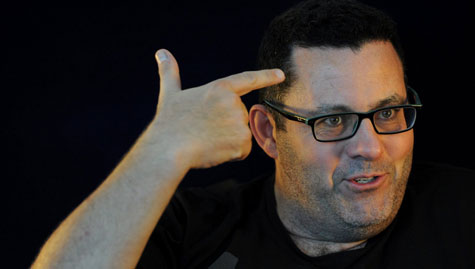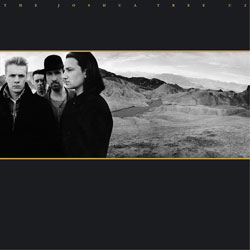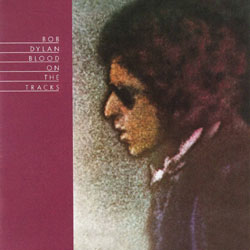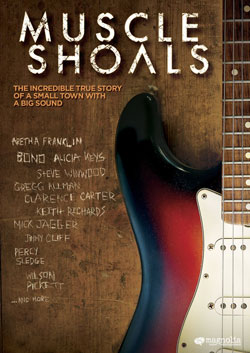
Confession time: I had Adrian McKinty in mind when I conceived of doing this column. I basically harassed his publishers about it, when I found out he would be spending some time in New York City, where I live. Of course, when you are interviewing an Irish crime writer whose series is set during “The Troubles” and whose protagonist, detective Sean Duffy, is both a major music fan and a hard-living guy, you expect your author to jump at the chance of meeting at a pub.
But McKinty is not Duffy: he had childcare obligations and work to do, so we met at an airy restaurant and drank fancy coffee instead of pints. But otherwise, McKinty is just as I wanted him to be: smart and funny, with wide-ranging interests (so many that this Q&A is pieced together from a couple of hours of chatting).
So, get ready for an unexpected analysis of 1970s Fleetwood Mac, a couple of avant-garde composers, nitpicking about U2, a requiem for bootleg culture, Adele versus Dusty Springfield, comparisons of Leonard Cohen covers, and a little Tom Waits. McKinty’s latest Duffy book is the excellent Rain Dogs.
Lisa: Duffy is not quite a generation older than you.
Adrian: Yes, he’s about a generation older than me.
Lisa: In picking the music for the Duffy books, there's a mixture of stuff that would be contemporary and some that he really loves, older than you or I. Was that just sort of a safety thing?
Adrian: That was probably the most enjoyable part of writing these books.
Lisa: I would imagine it would be.
Adrian: I was just going back and thinking to myself—now, what would Duffy be listening to today? I would go through my collection of CD's and vinyl, thinking Duffy would probably like this; then, I'd put the album on and think, well, maybe the other side. Then I'd listen to that. Like 40 minutes later, I'd think to myself, no, I don't think that's Duffy's cup of tea. Then I'd listen to 3 or 4 more albums, like obscure Roger Waters albums or something.
Lisa: I noted in one of the books, there was this Japanese composer who this friend of mine happens to be crazy about.
Adrian: That was Toru Takemitsu. I really like him, but he's so obscure. He does this weird minimalist music—it's a bit like listening to someone’s out-of-tune wind chimes.
Lisa: And in Gun Street Girl, there’s also another fairly obscure modern composer. A Finnish guy?
Adrian: I knew [Duffy] was going to go to Finland, so I ended up listening to about 30 of those guys. I found all their music on YouTube, oh God, I had a blast with that. I cheated a little bit on that one, because if I was listening to music that I absolutely loved, I loved it. I thought—wouldn't that be great if Duffy was listening to this when he was confronting the dude in the house? It's still playing through the speakers when he goes outside.
Then I did some research and discovered that it wasn't actually released until 1999. Two years after.
Lisa: I was wondering if you ever cheated.
Adrian: Then I thought—ah fuck it.
Lisa: No one else is going to look it up. Now, we're just going to put it on the web so people will know forever that you cheated.
Adrian: No one’s going to do the leg work. Then, I thought, maybe this guy got an early pressing.
Lisa: It might happen. I'm assuming that most of the musical taste you've given Duffy is your taste?
Adrian: A lot of it is my stuff. Duffy's a lot more prejudiced than I am. He doesn't really love 80s music, whereas that's my era. I grew up on 80s music.
Lisa: That's what I grew up on, too.
Adrian: I thought—I'll annoy him by putting a lot of music he doesn't like on the radio. He hates New Order. He hates Morrissey. I love New Order and I love Morrissey. He doesn't share a lot of my taste. Lawson [a junior detective in the series], he's a bit of a foil because Lawson's into stuff that I would be into in that period.
Lisa: Lawson's younger.
Adrian: Where Lawson says to Duffy, he's whinging about U2 or something and Lawson says …
 Lisa: Oh yeah, they have an argument about [U2’s] The Joshua Tree.
Lisa: Oh yeah, they have an argument about [U2’s] The Joshua Tree.
Adrian: Yeah. Somebody once started a review about that on Amazon.co.uk. I think he said this book is set in February 1987 and everyone knows that The Joshua Tree was released on March 10, 1987.
Lisa: Of course, everybody knows.
Adrian: They gave me a one-star review. I got a comment under the review that said, “Oh you know there were bootlegs floating around from the previous Christmas.”
Lisa: Yeah. I mean, obviously the records were done.
Adrian: I actually had one of those bootlegs. I got it as a Christmas present from my little brother. So I wrote that as a comment.
Lisa: It makes me really sad that the culture of the bootleg is kind of gone. I grew up in the same time you did, and it was a vinyl culture and bootlegs were really special. It was hard to record a live show. In New York, at least, it was quite a difficult thing to do. I made one of a Robyn Hitchcock show, and that tape was my most prized possession for years.
It was a terrible recording, and I can hear all of my friends on it, but it was just fun.
Adrian: Bob Dylan always had lots of bootlegs—albums that had never been released.
Lisa: The people who really started it were the Dead fans trading tapes.
 Adrian: My friend John said to me, “You know for the Blood on the Tracks album, Dylan recorded 22 songs—12 made it onto the album and 10 didn't make it onto the album.”
Adrian: My friend John said to me, “You know for the Blood on the Tracks album, Dylan recorded 22 songs—12 made it onto the album and 10 didn't make it onto the album.”
Then he said, “You know I've got the ten. They're as good as the ones that made it onto the album.“
Lisa: Yeah, I've heard those songs.
Adrian: He never released it!
Lisa: I mean that's just a spectacular period.
Adrian: Yeah, so he decides not to release them at all.
Lisa: I have a lot of rants about what's wrong with music today, but one of the things I really do feel is wrong with music today is there's no editorial thought that's put into making an album. In part, this is because it's become a singles culture—we're much more into songs than we are into records. To me, making a perfect record, like a 12 or 13 song record, it's a real art form that's lost.
Adrian: Exactly. I mean all you need is 3 good songs, really, and then you can fill it with the other 6. Then, people will buy it.
Lisa: Even bands that I've liked from the last like 15 years, nearly all of their records are too long. I'm the same way when I go to the movies. I'm like—I could have cut 40 minutes out of that.
Adrian: Me too. I always feel that way.
Lisa: Nothing needs to be 3 hours.
Adrian: Everything can be 10% shorter.
Lisa: A 90-minute movie is the perfect length.
Adrian: I feel like most books are 10% too long. When I read my own books, I always go—yeah, that could have been 10% shorter.
Lisa: Actually one of the reasons I started reading more crime fiction is because I found a lot of the literary section just inextricably badly edited. The continuity is bad, the pacing is wrong.
Adrian: To have a page and a half of dad putting his shoes on…
[Long, non-music related discussion of literary fiction ensues.]
Lisa: The only time I've ever gotten an autograph from a musician it was Jeff Buckley, and it was right when Grace had come out. The only thing I had with me was my copy of The History of Sexuality. So, I have Jeff Buckley's autograph on the flyleaf of Foucault. Which, basically, is like my world collided; nothing could make me happier than those two things together. Like peanut butter and chocolate.
Adrian: [My wife’s] cousin is a musician. He was signed off in the 90s. We've been watching him at CBGB's. One night, Jeff Buckley was there—wasn't terribly well known at that stage. I remember Jeff Buckley did this long set, and then Andrew was supposed to come on after him. The whole time I was watching, the one and only time I'll ever get to see Jeff Buckley live, the whole time I was thinking I wish he'd get off. When's Andrew going to come on? That's 10:30 already—I have to get up in the morning.
Lisa: I saw him again four times. He was an on-and-off performer, depending on how wasted he was. The same as so many people. There are a couple of things I saw him do that are just, like, heart wrenching. I mean, so beautiful.
Adrian: He's an extraordinary singer. What do you feel about Rufus Wainwright's version of “Hallelujah”?
Lisa:I liked it.
Adrian: Do you think he ripped Buckley off?
Lisa: I think it's very similar. I don't know why, there's so many Leonard Cohen songs that you could do. If I were Rufus Wainwright, I would try and do “I'm Your Man” or something. There are so many songs that would lend themselves to more of a Rufus Wainwright interpretation.
Adrian: I cannot remember who it is, but they've made millions out of this song, and they pay the royalties to Leonard Cohen, but Jeff Buckley's estate hasn't got a penny. Even though this is basically Jeff Buckley's interpretation.
Lisa: Dusty Springfield could take anything and sing the hell out of it. Also, last year, I picked up the album were Randy Newman does all of [Harry] Nilssen—which is amazing. I mean, another way to totally rethink what are actually very simple pop songs, which are done in a completely new way. They sound like Randy Newman songs when he does them.
Adrian: It's quite an interesting thing when you go through your old albums. Then, you go—well, are other people today making stuff as good as this? Dusty in Memphis for example? Can Adele compare to Dusty in Memphis?
Lisa: I like Adele. She's got a very, very good voice. I think she's a very good song writer, but I don't get the chills that I get from Dusty Springfield. You know what the thing is? There's no Muscle Shoals behind Adele.
 Adrian: Have you seen the [Muscle Shoals] documentary?
Adrian: Have you seen the [Muscle Shoals] documentary?
Lisa: It was awesome. My husband trained as a recording engineer, that and Sound City are his favorites. Have you seen Sound City? Dave Grohl made it. Sound City was a studio in LA and they made a lot of the big 70s records there. There was a new console there. Apparently, Rupert Neve tricked it out just for Sound City.
Adrian: I like the bit in the Muscle Shoals movie when Lynyrd Skynyrd comes in and they record over their definitive version because they lose the rights. How could you lose the rights?
Lisa: This is my problem with Vinyl. I don't know if you’re watching the HBO show.
Adrian: I haven't seen any of that.
Lisa: It's actually not very good. I mean, there's obviously great material on the music industry in the 70s. It's so pandering.
Adrian: Where's that set?
Lisa: It's in New York. They've really sacrificed character and plot for the sex, drugs, and rock n’ roll thing. The guy who plays this sort of Johnny Thunder-ish character, is Mick Jagger's son. He's not that charismatic. How can somebody even try and be Johnny Thunders?
Adrian: They should have just done a miniseries about the making of that Fleetwood Mac album—you know, when they're all on cocaine.
Lisa: That's actually one of my favorite Rolling Stone [magazine] stories ever. I must have been 9. It was about the making of Rumours.
Adrian: Tusk, as well, is quite a story.
Lisa: Rumours is when they're all breaking up. They were doing tons of coke and sleeping with everyone. Yet, they made beautiful songs, not angry songs.
Lisa: Stevie [Nicks] and Lindsey [Buckingham]. She wrote “The Chain,” right?
Adrian: Then, Lindsey comes in with “Go Your Own Way.”
Lisa: “Go Your Own Way” and “Don't Stop.” “Don't Stop” is classic Buckingham.
Adrian: 70s LA.
Lisa: They actually made that album in Marin County. It was a very famous studio, which was basically—it was kind of like Todd Rundgren’s studio in upstate New York—very isolated, very beautiful. All there was to do was play, do drugs, and have sex.
Adrian: I think I knew that because I knew that they recorded—what's the one [Christine McVie] does on the piano?
Lisa: Oh, “Songbird.”
Adrian: I think they rented a theater in San Francisco to do that one.
Lisa: Yeah that makes sense.
Adrian: Then, she just plays on this grand piano. That's how they got their acoustics for that.
Lisa: That's beautiful. It’s one of my favorite records. My husband hates it because, weirdly, it's his ex-wife’s favorite record.
Adrian: He should get over that.
Lisa: From a production standpoint, it's amazing. I mean, if you listen to the stuff that's on the radio now, especially the way the drums and the bass are recorded, it just sounds so cheesy compared to the way that it’s been recorded.
Adrian: My nephews—they're boys. I have two girls, but my nephews were talking to me about…
Lisa: It's important to educate your girls musically.
Adrian: I try to beat them over the head with stuff.
Lisa: They'll get over the Taylor Swift, they will.
Adrian: I said, well listen, today you're going to listen to Sgt. Pepper. You're just going to shut up, and you’re just going to listen.
Lisa: What's funny is my parents are music fans, but not as big as I am, but they bought records. My mom bought [Elvis Costello’s] Armed Forces and Get Happy, and I still have those copies. It was about buying records when I started buying them.
Adrian: On the drum sound thing: A friend said, ”My god! Wouldn't it be great if Led Zeppelin got back together for one last trip?“ And I said to him, ”Well he's the glue.” You listen to John Bonham, where do you get that sound anywhere else?
The sounds I love have been sampled by so many people over so many rap albums, they think that people can do that stuff, but they cannot. No one can replicate that sound that he somehow got.
Lisa: I keep telling my friends, who have a 9 year old daughter. They're encouraging her to do music. Give her a bass, get her a drum kit. Those guys never last for a band. Every drummer I've known has been in like 2 or 3 bands at once. The drummers are always crazy. You're constantly having to get a new drummer.
Adrian: Drummers are constantly getting fired. Singers, they blow their voices out.
Lisa: I mean drummers are in good shape. Physically, it's good exercise.
Adrian: You have to be. Although, I've never liked the drummer as the lead singer.
Lisa: I find that's a Phil Collins. That's confusing.
Adrian: The Eagles did that for a while.
Lisa: You know who it works for? The Band. That's the only time it works. Levon Helm can sing anything.
Adrian: I find it so distracting to watch. If I didn't know about it, I could cope with it, but when it's on TV or something, and I see a singing drummer, there's so much to do. I just find it so stressful.
Lisa: Let’s finish up with Tom Waits, who is sort of Duffy’s patron saint.
Adrian: Tom Waits is an easy one. I was very fortunate to grow up in the 70s and 80s with an older brother (7 years older) who had great taste in music. So, while kids my age were listening to Gary Glitter (shudders) or The Bay City Rollers, I had access to Bob Marley, Tom Waits, Neil Young, Patti Smith, Springsteen, Bob Dylan, and The Stones, who were all making incredible albums in the 70s. Waits, in particular, appealed to me because of his voice and his lyrics, which I thought were just as beautiful and intriguing as Dylan's.

Duffy, too, is a Waits fan—although not as big a fan as I am—and I knew that naming each book in the series after a Tom Waits song title or lyric would be a really nice way to establish the mood I was trying to capture. All the English versions of the books actually begin with the Tom Waits lyric from which the title is quoting, but alas, I couldn’t afford the North American rights too, so they just begin with a rather enigmatic title devoid of the context.
Adrian McKinty is the author of seventeen novels, including The Sun Is God and the Detective Sean Duffy novels, The Cold Cold Ground, I Hear the Sirens in the Street, In the Morning I’ll Be Gone―winner of the 2014 Ned Kelly Award for Best Fiction―and Gun Street Girl, which was named one of the Best Books of 2015 by the Boston Globe. Born and raised in Carrickfergus, Northern Ireland, McKinty was called “the best of the new generation of Irish crime novelists” in the Glasgow Herald.
Lisa Levy is the former EIC of The Life Sentence and the former Mystery/Noir editor at the LA Review of Books. She also has written about less nefarious topics for Pacific Standard, Dame, The Believer, Slate, Salon, and other publications. She is also a contributing editor and columnist at Literary Hub.

Bloody Bono
Very good choices all round, in particular for TheTwilight Zone. And another I’ve never, ever forgotten
Ho letto questo articolo è davvero fantastico.